University MPH Report: Public Health Leadership and Evaluation Issues
VerifiedAdded on 2020/05/04
|9
|2369
|65
Report
AI Summary
This report, prepared for a Master in Public Health program, delves into two critical areas: leadership issues and challenges in the monitoring and evaluation of public health programs. The first section examines the importance of effective leadership in achieving positive public health outcomes, highlighting issues such as vaccine availability and the need for strong leadership to address these challenges. It emphasizes the role of leadership in fostering community outcomes, disease prevention, and policy development. The second section focuses on the challenges faced during the monitoring and evaluation of public health programs, including a lack of experienced staff, inadequate resources, and gaps in technical knowledge. The report discusses the implications of these challenges, such as wasted expenditure and difficulties in measuring health gaps. The author reflects on the consequences of inadequate leadership and monitoring, emphasizing the need for improved strategies to enhance public health effectiveness and reach all segments of society. The report concludes by emphasizing the importance of leadership and robust monitoring and evaluation processes for the success of public health initiatives, offering insights into improving future programs.

Running head: MASTER IN PUBLIC HEALTH
Master in Public Health
Name of Student
Name of the University
Author Note
Master in Public Health
Name of Student
Name of the University
Author Note
Paraphrase This Document
Need a fresh take? Get an instant paraphrase of this document with our AI Paraphraser
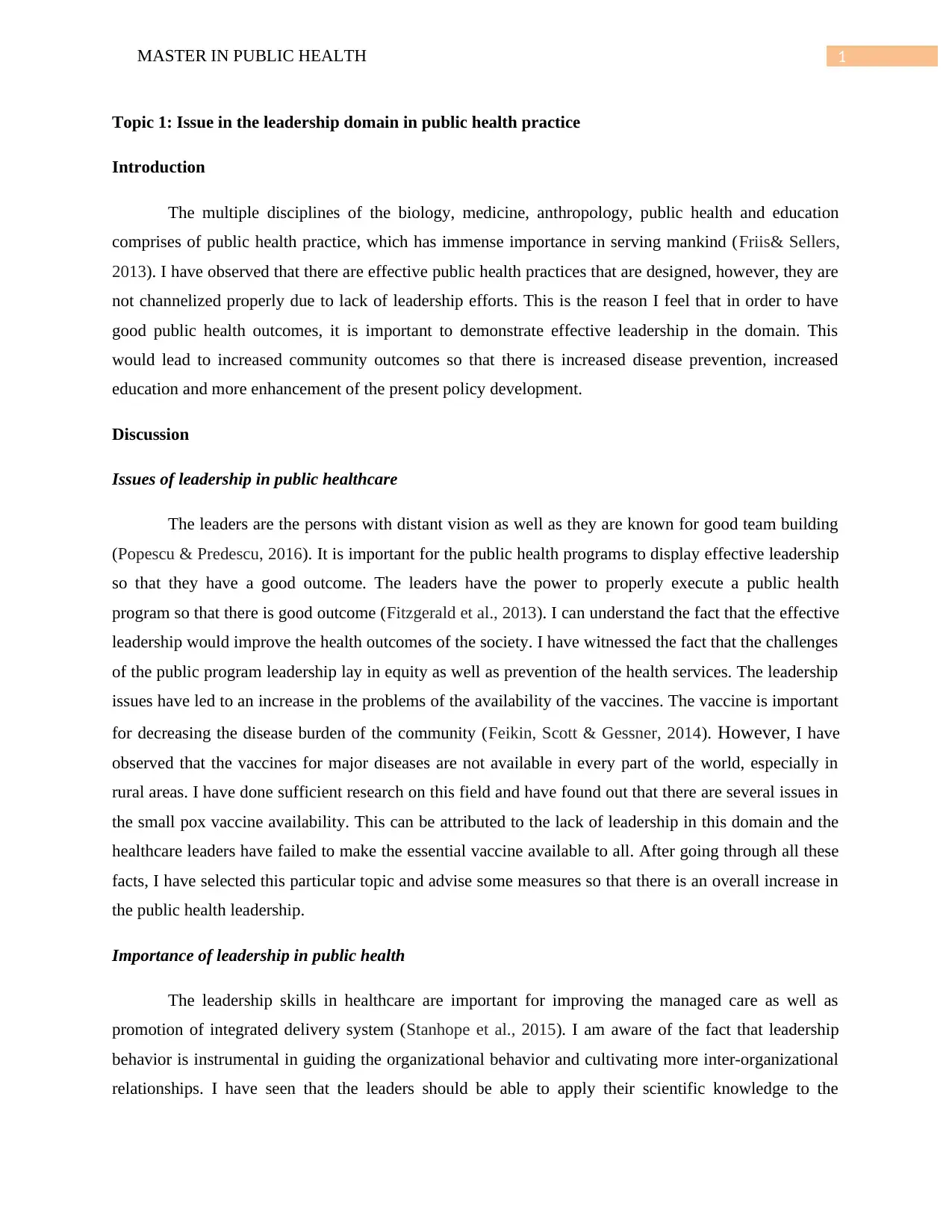
1MASTER IN PUBLIC HEALTH
Topic 1: Issue in the leadership domain in public health practice
Introduction
The multiple disciplines of the biology, medicine, anthropology, public health and education
comprises of public health practice, which has immense importance in serving mankind (Friis& Sellers,
2013). I have observed that there are effective public health practices that are designed, however, they are
not channelized properly due to lack of leadership efforts. This is the reason I feel that in order to have
good public health outcomes, it is important to demonstrate effective leadership in the domain. This
would lead to increased community outcomes so that there is increased disease prevention, increased
education and more enhancement of the present policy development.
Discussion
Issues of leadership in public healthcare
The leaders are the persons with distant vision as well as they are known for good team building
(Popescu & Predescu, 2016). It is important for the public health programs to display effective leadership
so that they have a good outcome. The leaders have the power to properly execute a public health
program so that there is good outcome (Fitzgerald et al., 2013). I can understand the fact that the effective
leadership would improve the health outcomes of the society. I have witnessed the fact that the challenges
of the public program leadership lay in equity as well as prevention of the health services. The leadership
issues have led to an increase in the problems of the availability of the vaccines. The vaccine is important
for decreasing the disease burden of the community (Feikin, Scott & Gessner, 2014). However, I have
observed that the vaccines for major diseases are not available in every part of the world, especially in
rural areas. I have done sufficient research on this field and have found out that there are several issues in
the small pox vaccine availability. This can be attributed to the lack of leadership in this domain and the
healthcare leaders have failed to make the essential vaccine available to all. After going through all these
facts, I have selected this particular topic and advise some measures so that there is an overall increase in
the public health leadership.
Importance of leadership in public health
The leadership skills in healthcare are important for improving the managed care as well as
promotion of integrated delivery system (Stanhope et al., 2015). I am aware of the fact that leadership
behavior is instrumental in guiding the organizational behavior and cultivating more inter-organizational
relationships. I have seen that the leaders should be able to apply their scientific knowledge to the
Topic 1: Issue in the leadership domain in public health practice
Introduction
The multiple disciplines of the biology, medicine, anthropology, public health and education
comprises of public health practice, which has immense importance in serving mankind (Friis& Sellers,
2013). I have observed that there are effective public health practices that are designed, however, they are
not channelized properly due to lack of leadership efforts. This is the reason I feel that in order to have
good public health outcomes, it is important to demonstrate effective leadership in the domain. This
would lead to increased community outcomes so that there is increased disease prevention, increased
education and more enhancement of the present policy development.
Discussion
Issues of leadership in public healthcare
The leaders are the persons with distant vision as well as they are known for good team building
(Popescu & Predescu, 2016). It is important for the public health programs to display effective leadership
so that they have a good outcome. The leaders have the power to properly execute a public health
program so that there is good outcome (Fitzgerald et al., 2013). I can understand the fact that the effective
leadership would improve the health outcomes of the society. I have witnessed the fact that the challenges
of the public program leadership lay in equity as well as prevention of the health services. The leadership
issues have led to an increase in the problems of the availability of the vaccines. The vaccine is important
for decreasing the disease burden of the community (Feikin, Scott & Gessner, 2014). However, I have
observed that the vaccines for major diseases are not available in every part of the world, especially in
rural areas. I have done sufficient research on this field and have found out that there are several issues in
the small pox vaccine availability. This can be attributed to the lack of leadership in this domain and the
healthcare leaders have failed to make the essential vaccine available to all. After going through all these
facts, I have selected this particular topic and advise some measures so that there is an overall increase in
the public health leadership.
Importance of leadership in public health
The leadership skills in healthcare are important for improving the managed care as well as
promotion of integrated delivery system (Stanhope et al., 2015). I am aware of the fact that leadership
behavior is instrumental in guiding the organizational behavior and cultivating more inter-organizational
relationships. I have seen that the leaders should be able to apply their scientific knowledge to the
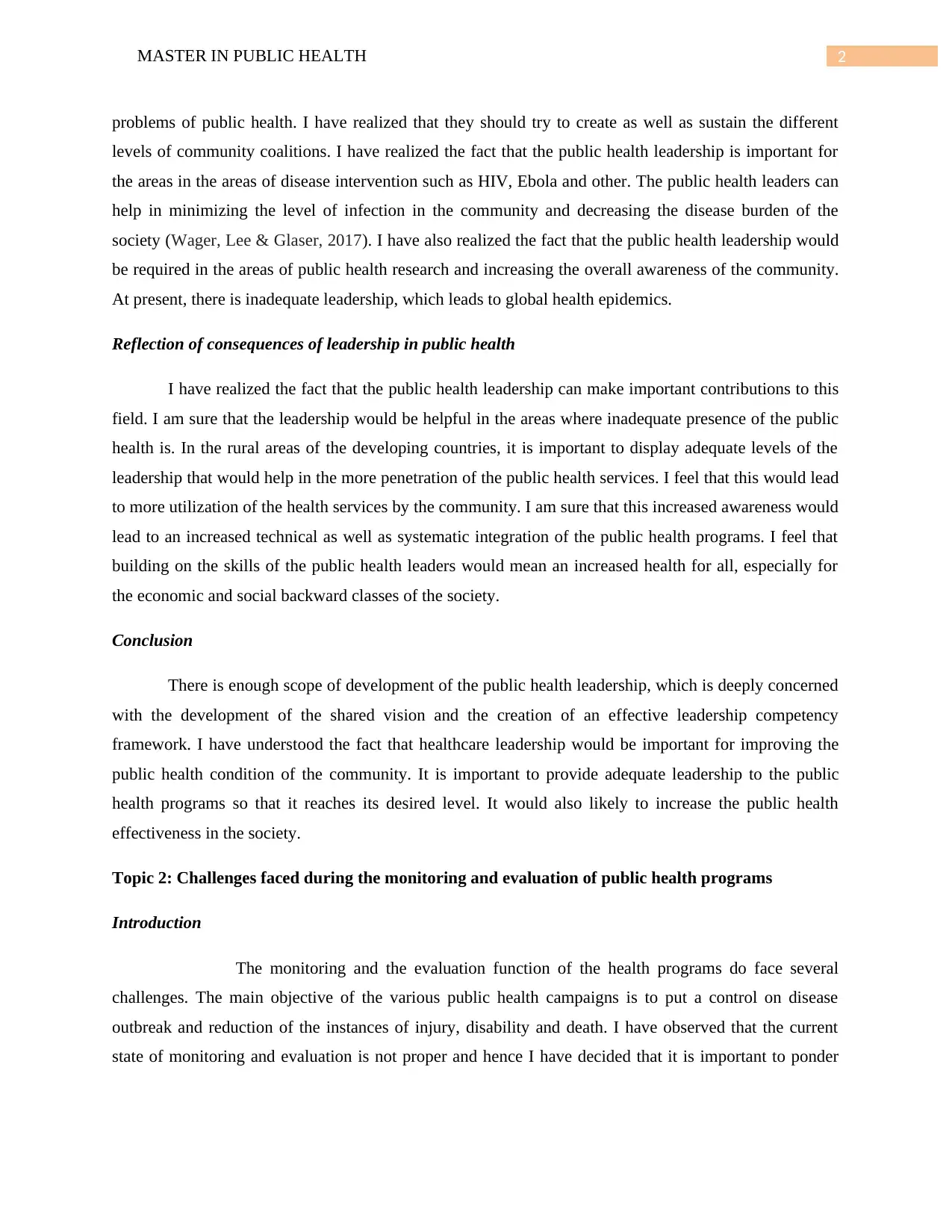
2MASTER IN PUBLIC HEALTH
problems of public health. I have realized that they should try to create as well as sustain the different
levels of community coalitions. I have realized the fact that the public health leadership is important for
the areas in the areas of disease intervention such as HIV, Ebola and other. The public health leaders can
help in minimizing the level of infection in the community and decreasing the disease burden of the
society (Wager, Lee & Glaser, 2017). I have also realized the fact that the public health leadership would
be required in the areas of public health research and increasing the overall awareness of the community.
At present, there is inadequate leadership, which leads to global health epidemics.
Reflection of consequences of leadership in public health
I have realized the fact that the public health leadership can make important contributions to this
field. I am sure that the leadership would be helpful in the areas where inadequate presence of the public
health is. In the rural areas of the developing countries, it is important to display adequate levels of the
leadership that would help in the more penetration of the public health services. I feel that this would lead
to more utilization of the health services by the community. I am sure that this increased awareness would
lead to an increased technical as well as systematic integration of the public health programs. I feel that
building on the skills of the public health leaders would mean an increased health for all, especially for
the economic and social backward classes of the society.
Conclusion
There is enough scope of development of the public health leadership, which is deeply concerned
with the development of the shared vision and the creation of an effective leadership competency
framework. I have understood the fact that healthcare leadership would be important for improving the
public health condition of the community. It is important to provide adequate leadership to the public
health programs so that it reaches its desired level. It would also likely to increase the public health
effectiveness in the society.
Topic 2: Challenges faced during the monitoring and evaluation of public health programs
Introduction
The monitoring and the evaluation function of the health programs do face several
challenges. The main objective of the various public health campaigns is to put a control on disease
outbreak and reduction of the instances of injury, disability and death. I have observed that the current
state of monitoring and evaluation is not proper and hence I have decided that it is important to ponder
problems of public health. I have realized that they should try to create as well as sustain the different
levels of community coalitions. I have realized the fact that the public health leadership is important for
the areas in the areas of disease intervention such as HIV, Ebola and other. The public health leaders can
help in minimizing the level of infection in the community and decreasing the disease burden of the
society (Wager, Lee & Glaser, 2017). I have also realized the fact that the public health leadership would
be required in the areas of public health research and increasing the overall awareness of the community.
At present, there is inadequate leadership, which leads to global health epidemics.
Reflection of consequences of leadership in public health
I have realized the fact that the public health leadership can make important contributions to this
field. I am sure that the leadership would be helpful in the areas where inadequate presence of the public
health is. In the rural areas of the developing countries, it is important to display adequate levels of the
leadership that would help in the more penetration of the public health services. I feel that this would lead
to more utilization of the health services by the community. I am sure that this increased awareness would
lead to an increased technical as well as systematic integration of the public health programs. I feel that
building on the skills of the public health leaders would mean an increased health for all, especially for
the economic and social backward classes of the society.
Conclusion
There is enough scope of development of the public health leadership, which is deeply concerned
with the development of the shared vision and the creation of an effective leadership competency
framework. I have understood the fact that healthcare leadership would be important for improving the
public health condition of the community. It is important to provide adequate leadership to the public
health programs so that it reaches its desired level. It would also likely to increase the public health
effectiveness in the society.
Topic 2: Challenges faced during the monitoring and evaluation of public health programs
Introduction
The monitoring and the evaluation function of the health programs do face several
challenges. The main objective of the various public health campaigns is to put a control on disease
outbreak and reduction of the instances of injury, disability and death. I have observed that the current
state of monitoring and evaluation is not proper and hence I have decided that it is important to ponder
⊘ This is a preview!⊘
Do you want full access?
Subscribe today to unlock all pages.

Trusted by 1+ million students worldwide
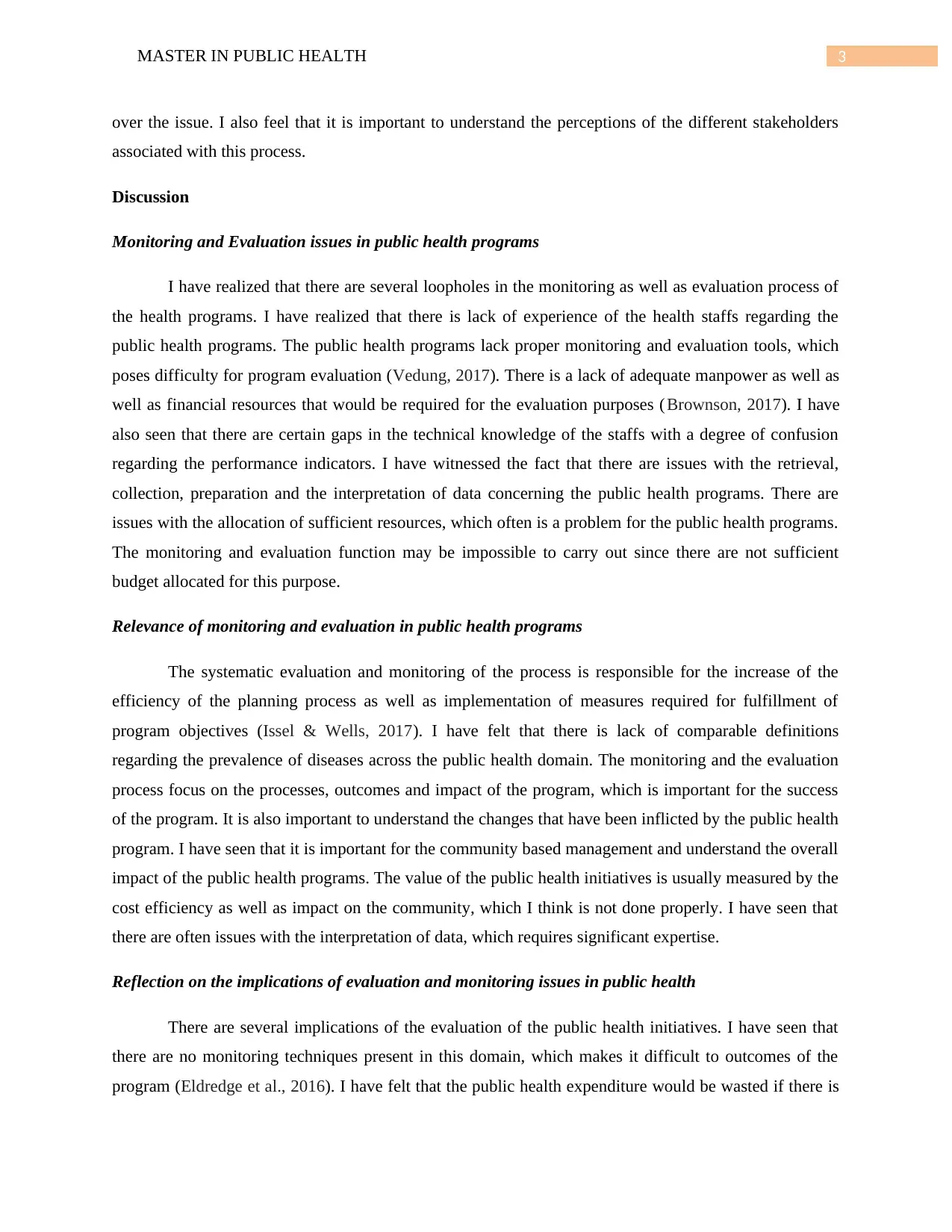
3MASTER IN PUBLIC HEALTH
over the issue. I also feel that it is important to understand the perceptions of the different stakeholders
associated with this process.
Discussion
Monitoring and Evaluation issues in public health programs
I have realized that there are several loopholes in the monitoring as well as evaluation process of
the health programs. I have realized that there is lack of experience of the health staffs regarding the
public health programs. The public health programs lack proper monitoring and evaluation tools, which
poses difficulty for program evaluation (Vedung, 2017). There is a lack of adequate manpower as well as
well as financial resources that would be required for the evaluation purposes ( Brownson, 2017). I have
also seen that there are certain gaps in the technical knowledge of the staffs with a degree of confusion
regarding the performance indicators. I have witnessed the fact that there are issues with the retrieval,
collection, preparation and the interpretation of data concerning the public health programs. There are
issues with the allocation of sufficient resources, which often is a problem for the public health programs.
The monitoring and evaluation function may be impossible to carry out since there are not sufficient
budget allocated for this purpose.
Relevance of monitoring and evaluation in public health programs
The systematic evaluation and monitoring of the process is responsible for the increase of the
efficiency of the planning process as well as implementation of measures required for fulfillment of
program objectives (Issel & Wells, 2017). I have felt that there is lack of comparable definitions
regarding the prevalence of diseases across the public health domain. The monitoring and the evaluation
process focus on the processes, outcomes and impact of the program, which is important for the success
of the program. It is also important to understand the changes that have been inflicted by the public health
program. I have seen that it is important for the community based management and understand the overall
impact of the public health programs. The value of the public health initiatives is usually measured by the
cost efficiency as well as impact on the community, which I think is not done properly. I have seen that
there are often issues with the interpretation of data, which requires significant expertise.
Reflection on the implications of evaluation and monitoring issues in public health
There are several implications of the evaluation of the public health initiatives. I have seen that
there are no monitoring techniques present in this domain, which makes it difficult to outcomes of the
program (Eldredge et al., 2016). I have felt that the public health expenditure would be wasted if there is
over the issue. I also feel that it is important to understand the perceptions of the different stakeholders
associated with this process.
Discussion
Monitoring and Evaluation issues in public health programs
I have realized that there are several loopholes in the monitoring as well as evaluation process of
the health programs. I have realized that there is lack of experience of the health staffs regarding the
public health programs. The public health programs lack proper monitoring and evaluation tools, which
poses difficulty for program evaluation (Vedung, 2017). There is a lack of adequate manpower as well as
well as financial resources that would be required for the evaluation purposes ( Brownson, 2017). I have
also seen that there are certain gaps in the technical knowledge of the staffs with a degree of confusion
regarding the performance indicators. I have witnessed the fact that there are issues with the retrieval,
collection, preparation and the interpretation of data concerning the public health programs. There are
issues with the allocation of sufficient resources, which often is a problem for the public health programs.
The monitoring and evaluation function may be impossible to carry out since there are not sufficient
budget allocated for this purpose.
Relevance of monitoring and evaluation in public health programs
The systematic evaluation and monitoring of the process is responsible for the increase of the
efficiency of the planning process as well as implementation of measures required for fulfillment of
program objectives (Issel & Wells, 2017). I have felt that there is lack of comparable definitions
regarding the prevalence of diseases across the public health domain. The monitoring and the evaluation
process focus on the processes, outcomes and impact of the program, which is important for the success
of the program. It is also important to understand the changes that have been inflicted by the public health
program. I have seen that it is important for the community based management and understand the overall
impact of the public health programs. The value of the public health initiatives is usually measured by the
cost efficiency as well as impact on the community, which I think is not done properly. I have seen that
there are often issues with the interpretation of data, which requires significant expertise.
Reflection on the implications of evaluation and monitoring issues in public health
There are several implications of the evaluation of the public health initiatives. I have seen that
there are no monitoring techniques present in this domain, which makes it difficult to outcomes of the
program (Eldredge et al., 2016). I have felt that the public health expenditure would be wasted if there is
Paraphrase This Document
Need a fresh take? Get an instant paraphrase of this document with our AI Paraphraser
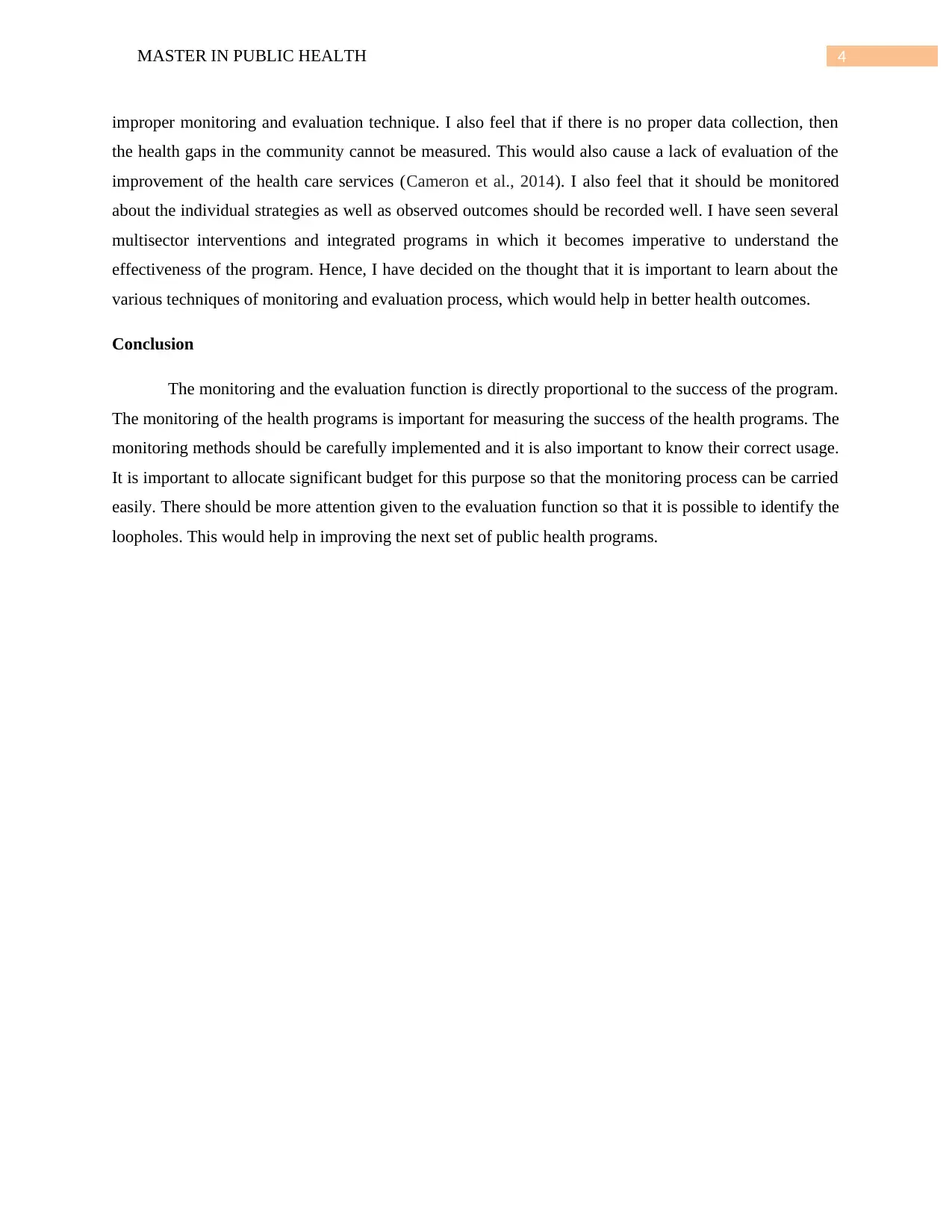
4MASTER IN PUBLIC HEALTH
improper monitoring and evaluation technique. I also feel that if there is no proper data collection, then
the health gaps in the community cannot be measured. This would also cause a lack of evaluation of the
improvement of the health care services (Cameron et al., 2014). I also feel that it should be monitored
about the individual strategies as well as observed outcomes should be recorded well. I have seen several
multisector interventions and integrated programs in which it becomes imperative to understand the
effectiveness of the program. Hence, I have decided on the thought that it is important to learn about the
various techniques of monitoring and evaluation process, which would help in better health outcomes.
Conclusion
The monitoring and the evaluation function is directly proportional to the success of the program.
The monitoring of the health programs is important for measuring the success of the health programs. The
monitoring methods should be carefully implemented and it is also important to know their correct usage.
It is important to allocate significant budget for this purpose so that the monitoring process can be carried
easily. There should be more attention given to the evaluation function so that it is possible to identify the
loopholes. This would help in improving the next set of public health programs.
improper monitoring and evaluation technique. I also feel that if there is no proper data collection, then
the health gaps in the community cannot be measured. This would also cause a lack of evaluation of the
improvement of the health care services (Cameron et al., 2014). I also feel that it should be monitored
about the individual strategies as well as observed outcomes should be recorded well. I have seen several
multisector interventions and integrated programs in which it becomes imperative to understand the
effectiveness of the program. Hence, I have decided on the thought that it is important to learn about the
various techniques of monitoring and evaluation process, which would help in better health outcomes.
Conclusion
The monitoring and the evaluation function is directly proportional to the success of the program.
The monitoring of the health programs is important for measuring the success of the health programs. The
monitoring methods should be carefully implemented and it is also important to know their correct usage.
It is important to allocate significant budget for this purpose so that the monitoring process can be carried
easily. There should be more attention given to the evaluation function so that it is possible to identify the
loopholes. This would help in improving the next set of public health programs.
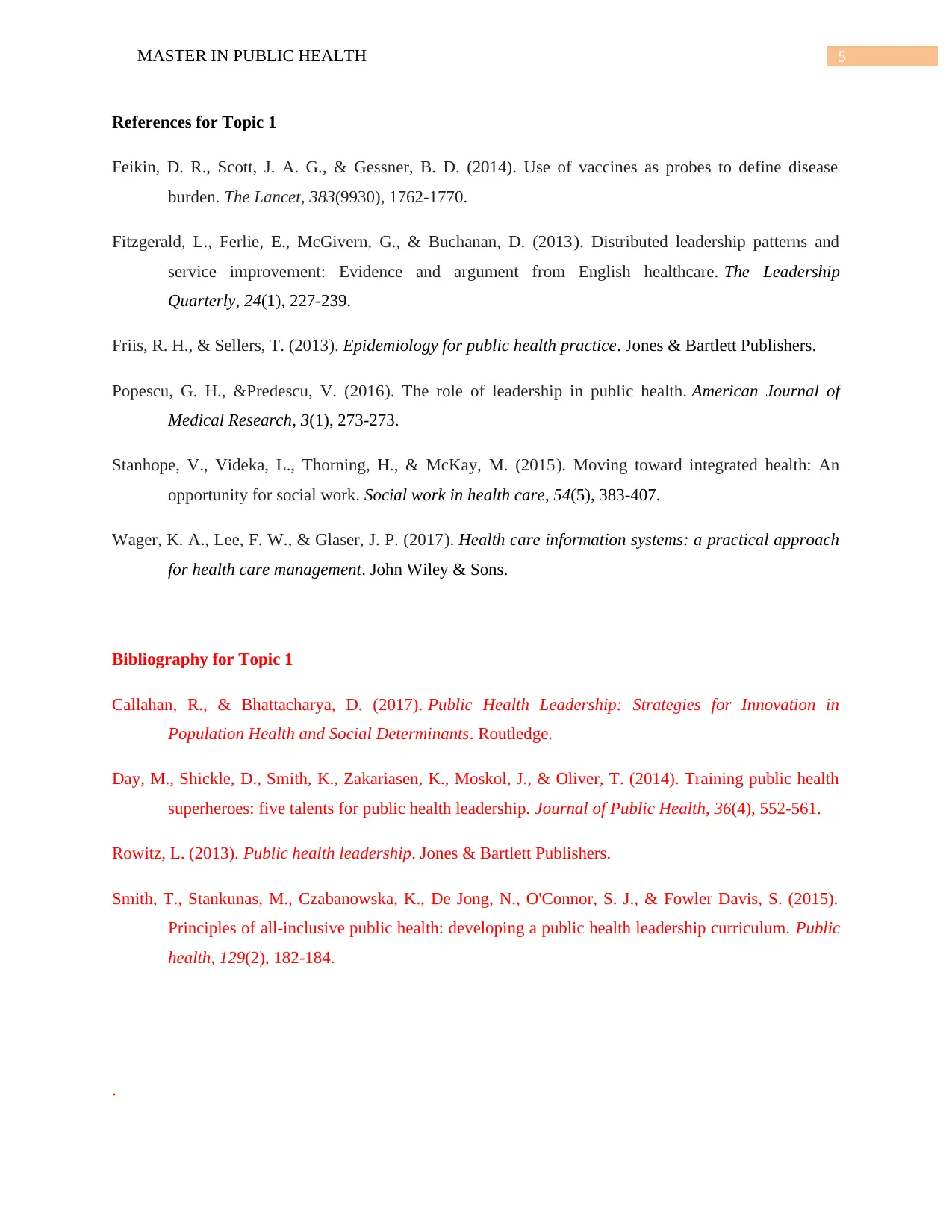
5MASTER IN PUBLIC HEALTH
References for Topic 1
Feikin, D. R., Scott, J. A. G., & Gessner, B. D. (2014). Use of vaccines as probes to define disease
burden. The Lancet, 383(9930), 1762-1770.
Fitzgerald, L., Ferlie, E., McGivern, G., & Buchanan, D. (2013). Distributed leadership patterns and
service improvement: Evidence and argument from English healthcare. The Leadership
Quarterly, 24(1), 227-239.
Friis, R. H., & Sellers, T. (2013). Epidemiology for public health practice. Jones & Bartlett Publishers.
Popescu, G. H., &Predescu, V. (2016). The role of leadership in public health. American Journal of
Medical Research, 3(1), 273-273.
Stanhope, V., Videka, L., Thorning, H., & McKay, M. (2015). Moving toward integrated health: An
opportunity for social work. Social work in health care, 54(5), 383-407.
Wager, K. A., Lee, F. W., & Glaser, J. P. (2017). Health care information systems: a practical approach
for health care management. John Wiley & Sons.
Bibliography for Topic 1
Callahan, R., & Bhattacharya, D. (2017). Public Health Leadership: Strategies for Innovation in
Population Health and Social Determinants. Routledge.
Day, M., Shickle, D., Smith, K., Zakariasen, K., Moskol, J., & Oliver, T. (2014). Training public health
superheroes: five talents for public health leadership. Journal of Public Health, 36(4), 552-561.
Rowitz, L. (2013). Public health leadership. Jones & Bartlett Publishers.
Smith, T., Stankunas, M., Czabanowska, K., De Jong, N., O'Connor, S. J., & Fowler Davis, S. (2015).
Principles of all-inclusive public health: developing a public health leadership curriculum. Public
health, 129(2), 182-184.
.
References for Topic 1
Feikin, D. R., Scott, J. A. G., & Gessner, B. D. (2014). Use of vaccines as probes to define disease
burden. The Lancet, 383(9930), 1762-1770.
Fitzgerald, L., Ferlie, E., McGivern, G., & Buchanan, D. (2013). Distributed leadership patterns and
service improvement: Evidence and argument from English healthcare. The Leadership
Quarterly, 24(1), 227-239.
Friis, R. H., & Sellers, T. (2013). Epidemiology for public health practice. Jones & Bartlett Publishers.
Popescu, G. H., &Predescu, V. (2016). The role of leadership in public health. American Journal of
Medical Research, 3(1), 273-273.
Stanhope, V., Videka, L., Thorning, H., & McKay, M. (2015). Moving toward integrated health: An
opportunity for social work. Social work in health care, 54(5), 383-407.
Wager, K. A., Lee, F. W., & Glaser, J. P. (2017). Health care information systems: a practical approach
for health care management. John Wiley & Sons.
Bibliography for Topic 1
Callahan, R., & Bhattacharya, D. (2017). Public Health Leadership: Strategies for Innovation in
Population Health and Social Determinants. Routledge.
Day, M., Shickle, D., Smith, K., Zakariasen, K., Moskol, J., & Oliver, T. (2014). Training public health
superheroes: five talents for public health leadership. Journal of Public Health, 36(4), 552-561.
Rowitz, L. (2013). Public health leadership. Jones & Bartlett Publishers.
Smith, T., Stankunas, M., Czabanowska, K., De Jong, N., O'Connor, S. J., & Fowler Davis, S. (2015).
Principles of all-inclusive public health: developing a public health leadership curriculum. Public
health, 129(2), 182-184.
.
⊘ This is a preview!⊘
Do you want full access?
Subscribe today to unlock all pages.

Trusted by 1+ million students worldwide
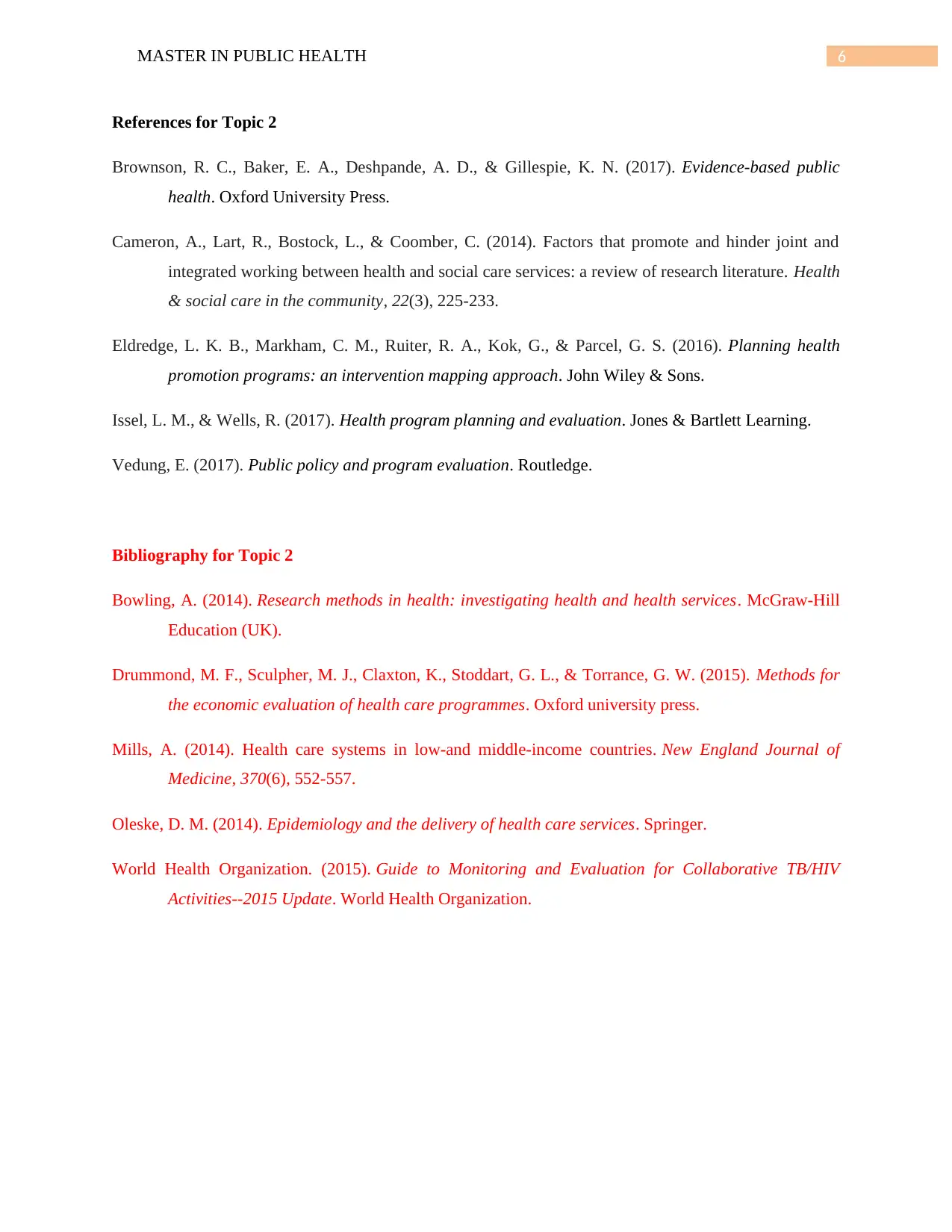
6MASTER IN PUBLIC HEALTH
References for Topic 2
Brownson, R. C., Baker, E. A., Deshpande, A. D., & Gillespie, K. N. (2017). Evidence-based public
health. Oxford University Press.
Cameron, A., Lart, R., Bostock, L., & Coomber, C. (2014). Factors that promote and hinder joint and
integrated working between health and social care services: a review of research literature. Health
& social care in the community, 22(3), 225-233.
Eldredge, L. K. B., Markham, C. M., Ruiter, R. A., Kok, G., & Parcel, G. S. (2016). Planning health
promotion programs: an intervention mapping approach. John Wiley & Sons.
Issel, L. M., & Wells, R. (2017). Health program planning and evaluation. Jones & Bartlett Learning.
Vedung, E. (2017). Public policy and program evaluation. Routledge.
Bibliography for Topic 2
Bowling, A. (2014). Research methods in health: investigating health and health services. McGraw-Hill
Education (UK).
Drummond, M. F., Sculpher, M. J., Claxton, K., Stoddart, G. L., & Torrance, G. W. (2015). Methods for
the economic evaluation of health care programmes. Oxford university press.
Mills, A. (2014). Health care systems in low-and middle-income countries. New England Journal of
Medicine, 370(6), 552-557.
Oleske, D. M. (2014). Epidemiology and the delivery of health care services. Springer.
World Health Organization. (2015). Guide to Monitoring and Evaluation for Collaborative TB/HIV
Activities--2015 Update. World Health Organization.
References for Topic 2
Brownson, R. C., Baker, E. A., Deshpande, A. D., & Gillespie, K. N. (2017). Evidence-based public
health. Oxford University Press.
Cameron, A., Lart, R., Bostock, L., & Coomber, C. (2014). Factors that promote and hinder joint and
integrated working between health and social care services: a review of research literature. Health
& social care in the community, 22(3), 225-233.
Eldredge, L. K. B., Markham, C. M., Ruiter, R. A., Kok, G., & Parcel, G. S. (2016). Planning health
promotion programs: an intervention mapping approach. John Wiley & Sons.
Issel, L. M., & Wells, R. (2017). Health program planning and evaluation. Jones & Bartlett Learning.
Vedung, E. (2017). Public policy and program evaluation. Routledge.
Bibliography for Topic 2
Bowling, A. (2014). Research methods in health: investigating health and health services. McGraw-Hill
Education (UK).
Drummond, M. F., Sculpher, M. J., Claxton, K., Stoddart, G. L., & Torrance, G. W. (2015). Methods for
the economic evaluation of health care programmes. Oxford university press.
Mills, A. (2014). Health care systems in low-and middle-income countries. New England Journal of
Medicine, 370(6), 552-557.
Oleske, D. M. (2014). Epidemiology and the delivery of health care services. Springer.
World Health Organization. (2015). Guide to Monitoring and Evaluation for Collaborative TB/HIV
Activities--2015 Update. World Health Organization.
Paraphrase This Document
Need a fresh take? Get an instant paraphrase of this document with our AI Paraphraser

7MASTER IN PUBLIC HEALTH

8MASTER IN PUBLIC HEALTH
⊘ This is a preview!⊘
Do you want full access?
Subscribe today to unlock all pages.

Trusted by 1+ million students worldwide
1 out of 9
Related Documents
Your All-in-One AI-Powered Toolkit for Academic Success.
+13062052269
info@desklib.com
Available 24*7 on WhatsApp / Email
![[object Object]](/_next/static/media/star-bottom.7253800d.svg)
Unlock your academic potential
Copyright © 2020–2026 A2Z Services. All Rights Reserved. Developed and managed by ZUCOL.





